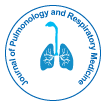Exploring the Impact of Artificial Intelligence on Pulmonary Disease Management
Received Date: Aug 03, 2024 / Published Date: Aug 31, 2024
Abstract
Artificial Intelligence (AI) is rapidly transforming various aspects of healthcare, and its impact on pulmonary disease management is particularly noteworthy. This review examines the role of AI in enhancing diagnostic accuracy, personalizing treatment, and improving patient outcomes in pulmonology. AI technologies, including machine learning algorithms and neural networks, have been integrated into pulmonary diagnostics to analyze complex imaging data, such as high-resolution computed tomography (HRCT) and chest X-rays, with unprecedented precision. These advancements enable earlier detection of pulmonary conditions, such as chronic obstructive pulmonary disease (COPD) and lung cancer, and facilitate more accurate disease characterization. AI is also revolutionizing therapeutic approaches by enabling the development of personalized treatment plans based on individual patient data. Predictive models and decision-support systems assist clinicians in tailoring interventions and monitoring disease progression, thereby optimizing therapeutic efficacy and minimizing adverse effects. Furthermore, AI-driven tools are improving patient engagement and adherence through digital health platforms and remote monitoring systems. The implementation of AI in pulmonology presents several challenges, including the need for robust data privacy measures, integration with existing healthcare systems, and the necessity of continuous validation to ensure clinical reliability. Despite these challenges, the potential benefits of AI in enhancing pulmonary disease management are substantial. This review highlights current applications of AI in pulmonology, discusses the implications for clinical practice, and identifies future research directions to further integrate AI technologies into routine pulmonary care. The ongoing advancements in AI hold promise for more effective, personalized, and efficient management of pulmonary diseases.
Citation: Xioa A (2024) Exploring the Impact of Artificial Intelligence on PulmonaryDisease Management. J Pulm Res Dis 8: 211.
Copyright: © 2024 Xioa A. This is an open-access article distributed under theterms of the Creative Commons Attribution License, which permits unrestricteduse, distribution, and reproduction in any medium, provided the original author andsource are credited.
